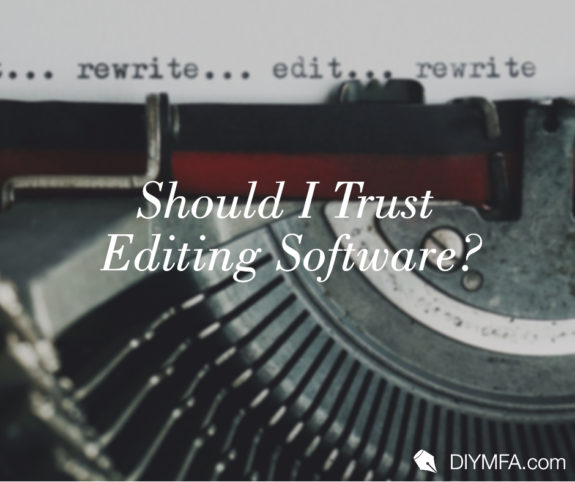Editing is often cited as the most difficult part of the writing process. Having taken our unique ideas and formed them into sentences, how do we now evaluate the result and determine what’s good from what needs changing? Some changes will be obvious—usually from the squiggly red line underneath it. That’s right. Today we’re talking about grammar checkers and editing software.
There are many arguments concerning the usefulness of technology as an aid in editing. From simple, built-in spellchecks for Google and Word Docs to specialty editing software such as ProWritingAid or Grammarly, the choices for getting technological help are numerous. Each offers a different set of features, and they all use a unique version of AI to perfect their editing suggestions. While there are many points to consider on each side of the debate, today, I’d like to examine the top five arguments I commonly hear against the use of editing software.
1) Editing Software Makes You Lazy
The Argument
Grammar checkers and auto-corrections make writers lazy at catching and fixing their own mistakes.
The Rebuttal
Is that laziness or efficiency? People have been throwing out their printed dictionaries along with the latest phonebook ever since the invention of editing software. As long as you look at what you’re fixing instead of hitting Accept All, you can still learn from your mistakes.
2) That’s What Editors Are For
The Argument
An editor will fix all of my mistakes for me.
The Rebuttal
No, we won’t. If you send me a document riddled with misspellings and basic errors, I would hand it right back and politely decline to take on the project. Your editing dollars are much better spent when the editor can look deeply at the text, which common and easily fixed errors make increasingly difficult.
3) Too Much Inaccuracy
The Argument
Grammar checkers are inherently flawed, constantly make incorrect suggestions, and should not be trusted.
The Rebuttal
Each grammar checker operates by its own set of rules. Incorrect suggestions may be a result of your preferences not matching that particular program’s algorithm or settings. Check out some different programs and see which one matches your version of grammar. Many programs can integrate (such as using ProWritingAid as a Microsoft Word extension) which means you don’t have to compromise once you find the one you like.
4) Editing Software Turns Us into Sheep
The Argument
Editing programs are trying to turn my writing into the same style and voice as everyone else’s.
The Rebuttal
Not at all. All suggestions are just that—suggestions. Yes, they are making these based on a common set of rules, but even so, this can actually be a really great thing. Using editing software for a business can mean every employee’s communications or writing remains consistent. Some programs allow you to set up personalized style sheets so everyone in the company uses “%” instead of “percent” or adds the Oxford comma, etc. For creative writing though, it won’t sound like everyone else’s just because you run it through an editing program.
5) No Personalization
The Argument
Grammar checking programs don’t really know my writing and therefore won’t be useful.
The Rebuttal
Maybe you just need to use it longer. Advanced editing software such as ProWritingAid is designed to learn from each suggestion you accept and decline so suggestions get better over time. There are also settings to adjust or even turn on and off that can help customize the algorithm to the type of document you are editing.
All Hail the Grammar Checker
In the end, whether you turn off every piece of technological help down to the spellcheck or run your manuscript religiously through your editing program, it’s up to you as the writer to make the final choice. Remember, any grammar debate is simply a debate, not a conclusive end-all-be-all answer (even when you’re having that debate with an editing program).
Prefer to get answers straight from the editor’s mouth? Our friends at ProWritingAid have put together a FREE ebook—20 Editing Tips from Professional Writers. Check it out!
Editor’s Note: DIY MFA is an affiliate for ProWritingAid. This means that if you download the ebook and later purchase a subscription, we may earn a commission at no extra cost to you.

Jeanette the Writer is an editor, coach, and freelance writer who wants to help others demolish their editing fears and finish their manuscript. As a former scuba instructor turned entrepreneur, Jeanette knows about putting in the hard work to pursue your passions. She has worked with authors, speakers, coaches, and entrepreneurs—empowering them with the right mindset, knowledge, and tools to help them tackle their editing goals. You can learn more about Jeanette by visiting JeanetteTheWriter.com.







